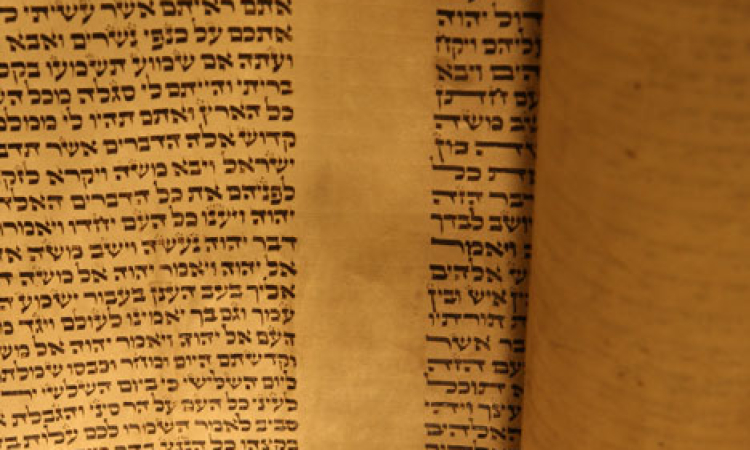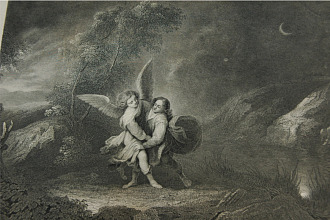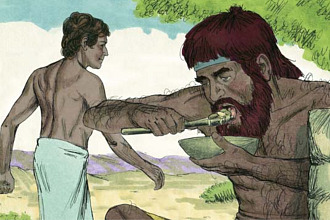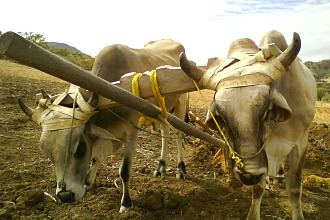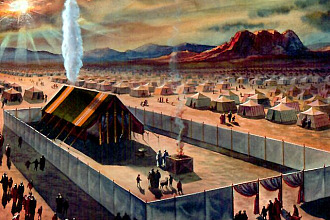Parasha for the week: Michpatim - Exodus 21:1 - 24:18
Aftarah for the week: Jeremiah 33: 25 - 34:22
Brit HaChadasha: Acts 23:5
Parasha Overview
• One of the longest Torah portions, containing:
23 positive commandments
30 negative commandments.
• Israel receive a series of laws concerning social justice, topics include:
- Good treatment of servants
- Obligations to our spouse
- Punishments for hitting people, for cursing parents, judges and leaders
Financial responsibilities for damaging people, or their property, either by oneself or by one's animate or inanimate property, or by pitfalls that one created
- Payments for theft
- Not returning an object that one accepted responsibility to guard
- A person being robbed has right to self-defense.
• Other topics include:
- Prohibitions against seduction
- Witchcraft, bestiality and sacrifices to idols
- The Torah warns us to treat the convert, widow and orphan with dignity
- Avoid lying
- Usury is forbidden and the rights over collateral are limited
- Payment of obligations to the Temple should not be delayed
- God's people must be holy, even concerning food.
- The Torah teaches the proper conduct for judges in court proceedings
- The commandments of Shabbat and the Sabbatical year are outlined.
- Three times a year — Pesach, Shavuot and Succot —
we are to come to the Temple.
- G-d promises that He will lead the His people to the Land of Israel, helping them conquer its inhabitants, and tells them that by fulfilling His commandments they will bring blessings to their nation.
- The people promise to do and listen to everything that G-d says.
- Moshe writes the Book of the Covenant, and reads it to the people. Moshe ascends the mountain to remain there for 40 days in order to receive the two Tablets of the Covenant.
Last Shabbat, we read about the greatest event witnessed by Israel - God's descending on Mount Sinai and giving the Ten Commandments to the people of Israel.
Parashat Mishpatim begins with God telling Moshe, "And these are the laws which you shall set before them..." Rashi explains that this Parasha begins with the word "and" to teach us that the laws written in this Parasha, as well as the rest of the Torah, are also connected to the previous Parasha in which we read about the giving of the Ten Commandments at Mount Sinai.
In the end of the Parasha God said to Moshe, "Come up to Me to the mountain and be there and I will give you the tablets of stone and the Torah and the Mitzvot (commandments)... And Moshe went up to the mountain and Moshe remained on the mountain forty days and forty nights." Exodus 24:12, 18
One of Maimonides' thirteen principles of Jewish faith is, "I believe with complete faith that the entire Torah which we have now is the same one which was given to Moshe our teacher."
Just as the Ten Commandments were given by God at Mount Sinai, so, too, were the other laws of the Torah.
Parashat Mishpatim deals mostly with the category of mitzvot between one individual and the other. For example in this Parasha we are commanded about the laws of damages; dealings with parents; litigation; dealings with the poor, the widow and the orphan ("You must not mistreat any widow or orphan").
One of the 53 laws-mitzvot in this week's Parasha, Mishpatim, is the commandment to help the poor and needy whether through charity or a loan.
The Torah states, "When you will lend money to My people, to the poor with you, you shall not press him, neither shall you place upon him interest... for when he will cry to Me, I will hear for I am merciful."
The mitzvah of helping people in need is called "Gemilat Chasadim" - "performing deeds of kindness."
Rabbi Shabsi Kohen explains that the Torah is saying, "If God blessed you with money and means, make sure that you lend and help the poor man with you." For the true purpose for which God gave you wealth is so that you shall be generous to others.
"Giving Charity"
The Hebrew word for Charity is TSEDAKAH means righteousness, this word come from the word TSEDEK that means "justice" from the same root we have TSADIK, a righteous, when you want to say to someone that he is right, he is correct in what he is saying we say in Hebrew "you are TSODEK" when we give charity to a poor or to our congregation for the needy, we are not doing something exceptional, we are just doing what is "right", what is "correct".
One of the mitzvot in this week's Parasha, Mishpatim, is "Midvar Sheker Tirchak" - "Keep your distance from anything false."
Rabbi Zusia of Anipoli said: We do not find this expression with other sins. This teaches us how terrible the transgression of lying is, for the Torah not only prohibits speaking false, but also commands us, "to distance" ourselves from it.
The Talmud says, God's seal is truth (Emet)." Thus, the further one goes from "falsehood," the closer one comes to God, Who is Truth.
The word "Midvar" could also be read as "Midaber." This implies that you should keep your distance from one who speaks falsely. Associating with one who lies may lead to disaster.
The word "Sheker" gave the word "liar" in modern Hebrew "Shakran"
According to Rev 21:8 ... "all liars — their place will be in the ... the second death."
According to Rabbi Zelig Pliskin the Torah states, "And bribery you shall not take, for a bribe will blind those who can see, and distort the words of the righteous." (Ex. 23:8) What is the difference between a person who is blind and a person who is prejudiced because of a bias?
Rabbi Avraham of Sochotchov commented that when a person is blind, he realizes it and will ask someone who can see to help him; if a person has a bias, the bias blinds him to such an extent that he does not even realize that he is blind. He feels that what he perceives is reality and will refuse to listen to others.
Every human being is biased towards himself that he is correct. This keeps us from recognizing our mistakes and faults when people point them out. If you have an emotional knee-jerk reaction to reproof, weigh the matter very carefully. You will benefit in the long run.
"Stories"
Rabbi Schneur Zalmen of Liadi had a free loan society through which he would help people. He once asked the Rebbe for permission to hand over the society to someone else, claiming, "The Free Loan Organization steals lots of valuable time from me. I would prefer to devote that time to the study of Torah."
Rabbi Schneur Zalmen replied, "It is not true that acts of generosity and kindness 'steal' your time. If anything, it gives you more time!"
The lesson is clear: one does not 'lose' time by investing it in a mitzvah!
------------------
The money we earn comes through G-d's blessings. Therefore, we must remember the poor and needy for whom G-d intended a share of what He gave us.
In this week's Parasha, Mishpatim, the Torah commands, "If you see the donkey of your enemy lying under its burden, and you may not want to help him, you have to make every effort to help him."
One Thursday a Magid (preacher) had to travel to Minsk to deliver a sermon on Shabbat. It was a cold winter day and a heavy snow was falling. As a result, no coachman wanted to travel to the city. In desperation, the Magid hired a poor Jew with an old horse who was willing to make the trip. Driving on the icy road was very difficult. The horse wasn't in great shape to begin with, and certainly wasn't fit for traveling in such treacherous conditions.
Not too long after they set out, they came to a hill. "We have to get out and help push the carriage," said the coachman to the Magid. "My old mare isn't strong enough to pull the wagon up the hill."
The Magid had no choice but to get out and help push. They finally managed to get to the top of the hill. The Magid couldn't wait to climb back into the wagon, but the coachman said, "I'm sorry, you can't get back in yet. I need your help to hold the carriage back so it doesn't slide down the hill. My horse is in no shape to make it down the hill on her own." Groaning under the strain, the Magid held on to the wagon so it wouldn't slide down the hill.
Many times throughout the trip, the Magid was forced to assist the horse and carriage through mud and snow. At last, totally exhausted, the Magid arrived at his destination.
"I want to ask you a question," said the Magid to the driver. "I had a good reason to travel to this city, because I have to give a sermon in the synagogue. You also had a good reason to travel because you needed the money to feed your family. But, can you think of one good reason why the horse had to come all the way to Minsk?"
Haftara: Jeremiah 33:25 – 34:22
The prophecy given to Jeremiah was when the Babylonians wanted to destroy Jerusalem and to deport its inhabitants: "The word that came to Jeremiah from the LORD, when King Nebuchadrezzar of Babylon and all his army and all the kingdoms of the earth and all the peoples under his dominion were fighting against Jerusalem and all its cities: " (Jeremiah 33:26).
G-d said to the King of Judah that Babylon will have victory over Israel and the King will be deported too. "Thus says the L-RD, the G-d of Israel: Go and speak to King Zedekiah of Judah and say to him: Thus says the L-RD: I am going to give this city into the hand of the king of Babylon, and he shall burn it with fire. And you yourself shall not escape from his hand, but shall surely be captured and handed over to him;" (Jeremiah 34:2-3).
G-d said to Jeremiah that one of the reasons of the deportation was because Israel did not accept to ob¬serve the sabbatical year "The word of the L-RD came to Jeremiah from the L-RD: Thus says the L-RD, the G-d of Israel: I myself made a covenant with your an¬cestors when I brought them out of the land of Egypt, out of the house of slavery, saying, "Every seventh year each of you must set free any Hebrews who have been sold to you and have served you six years; you must set them free from your service." But your ancestors did not listen to me or incline their ears to me. " (Jeremiah 34:12-14).
However, the L-rd loves his people and will continue to love him, the deportation is a way G-d used to help Israel to understand their mission towards the nations, to be a light to the nations and to help each individual to believe in the only one G-d. Thus before giving the reasons of this defeat, G-d assured Israel that he will bring them back to their country: Thus says the L-RD: Only if I had not established my covenant with day and night and the ordinances of heaven and earth, would I reject the offspring of Jacob and of my servant David and not choose any of his descendants as rulers over the offspring of Abraham, Isaac, and Jacob. For I will restore their fortunes, and will have mercy upon them. (Jeremiah 33:25-26).
Brit HaChadasha: Acts 23:5
This week's parasha is very rich with many laws and famous sentences. There is at least four verses of this text which are quoted in the Brit Hachadasha.
However I am pointing out one of them. A mitzva mentioned in the chapter 22 of Exodus. It is written "You shall ... nor curse a ruler of your people." (Exodus 22:28). An important mitzva, maybe more for today than for the past, because today we have a natural tendency to distrust our leaders, not only leaders of the country or the city where we live, but also God's people leaders. This text says that we must have respect for the leaders G-d has chosen to lead his people.
However, the quotation of this text in the Apostolic Writings is interesting, because it is Rabbi Shaul who pronounced this mitzva. Looking at the context we discover that Shaul was arrested in the Temple of Jerusalem, he was brought before the Sanhedrin and was falsely accused: "Men of Israel, help us! This is the man who teaches all men everywhere against our people and our law and this place." (Acts 21:28).
However this accusation was not true, Rabbi Shaul was respectful of the Temple, of the Torah and of the people of Israel and his leadership. That is why, when he was taken for someone else, an Egyptian terrorist: "Aren't you the Egyptian who started a revolt and led four thousand terrorists out into the desert some time ago?" (Acts 21:38) had to justify himself and said: "I am a Jew, from Tarsus in Cilicia, a citizen of no ordinary city. Please let me speak to the people." (Acts 21:39).
He clearly identified himself, publicly with the Jewish people, he was proud to be a Jew and affirmed it clearly. Then when he was before the Sanhedrin, he spoke in a certain way to the High Priest and the people rebuked him, saying that he was speaking to the High Priest. And Shaul quoted by heart the verse of Exodus "I did not know, brothers, that he was the high priest, for it is written, 'You shall not speak evil of a ruler of your people.'" (Acts 23:5). This quote demonstrates that Shaul, knew very well the Torah, he was able to quote it by heart, but in addition this text demonstrates that Shaul was willing to observe the Torah, and to keep the Mitzvot of the Law.

